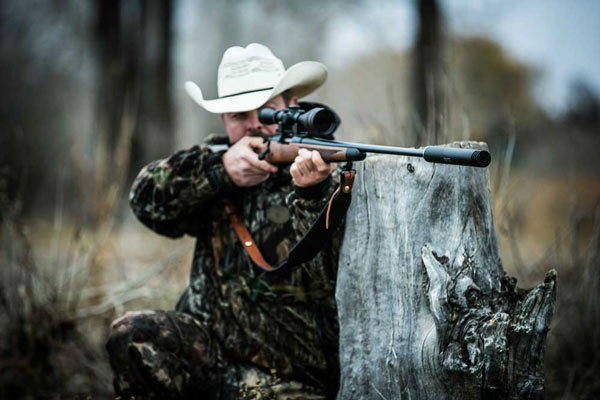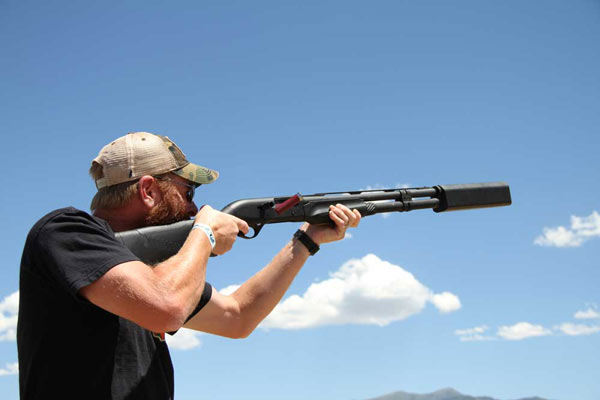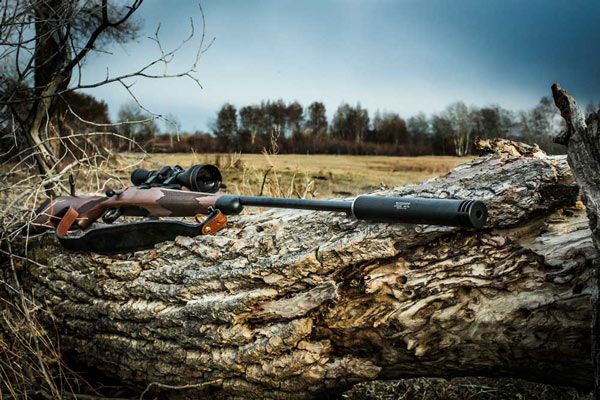March 13, 2015
By Mike Schoby
 It seems that no matter where I travel in the world, American hunters have it better than our counterparts in other countries. We can own semiautomatic rifles and shotguns, handguns, and even a .50 BMG if we so choose. No lengthy waiting period, no limit on how many firearms we can own, no justifying to an oppressive government why we need another firearm, or monthly restrictions on ammo.
It seems that no matter where I travel in the world, American hunters have it better than our counterparts in other countries. We can own semiautomatic rifles and shotguns, handguns, and even a .50 BMG if we so choose. No lengthy waiting period, no limit on how many firearms we can own, no justifying to an oppressive government why we need another firearm, or monthly restrictions on ammo.
So why aren't we on par with the rest of the world when it comes to suppressors? Almost every gun shop I visit outside the U.S. has racks of suppressors, available for purchase with no license required.
Foreign hunters often ask why Americans can't own something as civilized and sensible as a suppressor without ridiculous government oversight? I simply have no good answer. But luckily our deafening plight is changing.
As I write this, we are witnessing a revolution in suppressor ownership among hunters. This is a great thing and a concept with which every hunter would wholeheartedly agree€¦or so I thought.
Advertisement
I was at the range recently with a hunting buddy, and I mentioned that I wanted to get a suppressor.
"Why would you want one?" he retorted. "I don't see any use for them for hunters€¦unless you want to poach a deer."
I was shocked. My buddy doesn't have any experience with suppressors, but I never imagined he would be hanging on to this illogical rationale. So I set to schooling him.
Advertisement
"Why would I want to own one? Look around you my friend," I said, pointing toward the group of older regulars polishing the plywood seats of the benches at our local club. "You have to yell at these old boys to get their attention."
 Even though most folks wear hearing protection at the range, very few do so in the field — including yours truly. It's just not practical. Being able to hear a deer walking through the woods or a pheasant flush is part of the hunting experience, and not being able to hear puts you at a severe disadvantage.
Even though most folks wear hearing protection at the range, very few do so in the field — including yours truly. It's just not practical. Being able to hear a deer walking through the woods or a pheasant flush is part of the hunting experience, and not being able to hear puts you at a severe disadvantage.
You can wear amplified hearing protection, if you remember to bring it, or you can just attach hearing protection to the end of the rifle.
"Furthermore," I continued, "this isn't just about saving your own hearing. Remember last year when local homeowners complaining about noise pollution were threatening to have this place shut down? Suppressors solve that problem, too.
"Have you ever shot a rifle with a suppressor?" I continued, knowing the answer.
" No," my seemingly stunned friend replied.
"Well, therein lies the problem," I said. "Try it today and you'll forget that ridiculous poaching party line almost immediately. Not to mention you'll be more accurate."
"OK, OK, OK, shut up already," he said. "I see your point and stand corrected. Now that you have convinced me, I'm all in, but I can't even own one, so what's the point?"
Another common misconception I felt obligated to dash.
"Suppressors have never been illegal on a federal level," I replied. "They're just regulated a bit more than firearms. If you live in one of the 39 sensible states where they are legal, all you have to do is be 21, meet essentially the same criteria for owning a firearm, be prepared to wait several months for the BATFE to review your paperwork, and pay them a $200 tax."
"Dude, I'm sold," my buddy said with a huge grin. "If I had only known sooner...."
With that I had turned another misinformed dissenter into a full-blown believer.
If you're interested in joining this growing number of believers legally using suppressors for hunting, check out the American Suppressor Association today. The ASA is a unified organization of manufacturers, dealers, and consumers wishing to stay up to date on all the rules and policy changes affecting suppressors.
As for me, I ordered three SilencerCo suppressors: one for my .22 LR, one for my centerfire rifle, and one for my pistol. It is my first suppressor order, and I am going through the process as we speak. Stay tuned for future articles on the subject — and even more converts.

